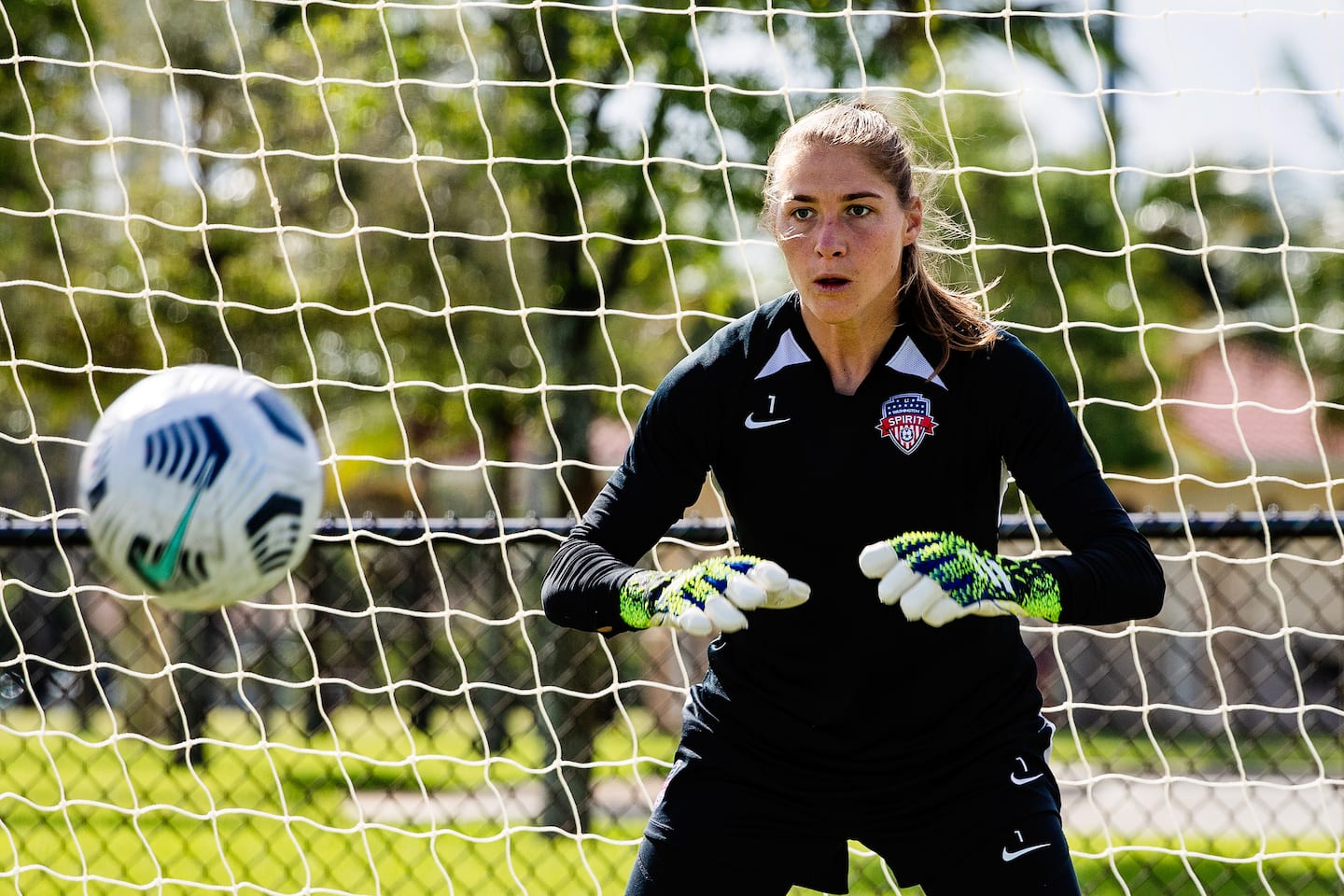Aubrey Bledsoe’s present is on the soccer pitch. Her future, she hopes, is in the boardroom.

“I don’t want to get to the end of my career and say, ‘Now what?’ ” she said.
That is why, each Monday evening and every other Friday night this spring, she opens her laptop and logs into two virtual classes — legal and ethical issues, and management information — as part of the MBA program at Shenandoah University, a Winchester, Va., school that partnered with the NWSL club to offer free tuition to the players.
Bledsoe is on the slow road, figuring it will take 2½ or three years to earn her master’s degree. She is in no hurry, her life currently consumed with saves and shutouts, making a case for the 2023 World Cup squad and helping the 10-team pro league blossom.
While soccer remains her focus, Bledsoe has embraced the idea of a business degree to not only prepare for her next chapter but also apply knowledge and insight toward female empowerment and influence in the sports world.
“I’d love to be part-owner of the Spirit or maybe another club,” she said. “I have joked with [managing partner] Steve Baldwin [that] I want my next contract to have equity. We want some skin in the game.”
The league does not offer continuing education programs as does MLS, the men’s circuit that’s aligned with Southern New Hampshire University. So when Baldwin, a local software executive, bought a majority stake in the Spirit before the 2019 season, he sought to prioritize such opportunities.
He and Bledsoe spent more than three hours discussing ways to improve the player experience.
“One of the things we talked about,” Baldwin said, “was being part of helping players prepare for life after soccer.”
Baldwin enlisted Shenandoah, a 4,200-student liberal arts school located 40 miles west of the Spirit’s base in Leesburg. It offers online courses and a secondary campus minutes from the apartment complex housing most players.
Tracy Fitzsimmons, the university’s president, and her husband, Knox Singleton, were among about 30 people who joined the Spirit’s investment team in February. That group also includes Chelsea Clinton and Jenna Bush Hager, the daughters of former U.S. presidents.
Bledsoe is not the only player to take up the educational offer. Defender Paige Nielsen is pursuing a graduate certificate in cybersecurity management.
With the perk of free tuition, the team believes the Spirit is well-positioned to attract players who want to finish undergrad work or pursue a master’s degree. The Orlando Pride has a similar partnership with Rasmussen University.
Bledsoe, a Wake Forest graduate, initially planned to attend medical school when her athletic career ended, which, given the precariousness of women’s pro soccer over 20 years, figured to have occurred by now. With the NWSL on more stable ground, though, career longevity has grown.
“Maybe I would play until I was 25 or 26 and then have to get a real job that pays better and I can support a family,” Bledsoe said. “You’d see a lot of people retire quietly after two or three years. Not so much now. I’m at a point where I’m finally earning a good wage and people aren’t asking me, ‘When are you going to give this up?’ It has become a viable career option.”
What’s changed is clubs now have supplemental cash to dole out. They also provide free housing.
Bledsoe, a Cincinnati native, pivoted from medicine to business after learning from Baldwin about the team and league operations. Furthermore, she said she was acutely aware of “the lack of women in sports business making decisions that affect female athletes.”
“Everyone is well-intentioned, but there has been a disconnect probably across the league,” she said.
Bledsoe revived her educational pursuits in the fall of 2019, enrolling in Harvard Business School’s “Crossover Into Business,” a one-semester program that was conducted primarily online and designed for pro athletes seeking careers after the games end. Classmates included tennis star Caroline Wozniacki.
Each athlete was paired with two Harvard student mentors. Every few weeks, Bledsoe scheduled time with them to discuss case studies, such as Dwyane Wade’s business interests. Bledsoe also chose to study the leadership and management methods of Alex Ferguson, the former Manchester United manager.
“Most athletes understand what they’re doing now can’t last forever, and this is actually the right moment to start exploring alternatives, not when they are retiring,” said Anita Elberse, a Harvard professor who launched the program in 2017. Participants have included former basketball players Chris Bosh, Alana Beard and Jameer Nelson.
Bledsoe sees the business world as a new frontier for NWSL players, many of whom turn to coaching for offseason and post-career opportunities.
“We have the time,” she said. “We train, of course, but afternoons are generally off. It’s great to be able to study and learn and push myself in another avenue. I’ve always loved challenging myself and learning new things. It’s great to have academics and soccer.”
Last year, NWSL players were vocal in their support of social justice issues, and U.S. national team players have long fought for fairness in the workplace.
“Before, no one wanted to hear what you had to say; they just wanted to watch you play,” Bledsoe said. “Now, you’re almost expected to say something. It’s crazy how that has turned. We’ve learned more, and we are more informed.
“We definitely need representation in that [business] area, so why not me?”






